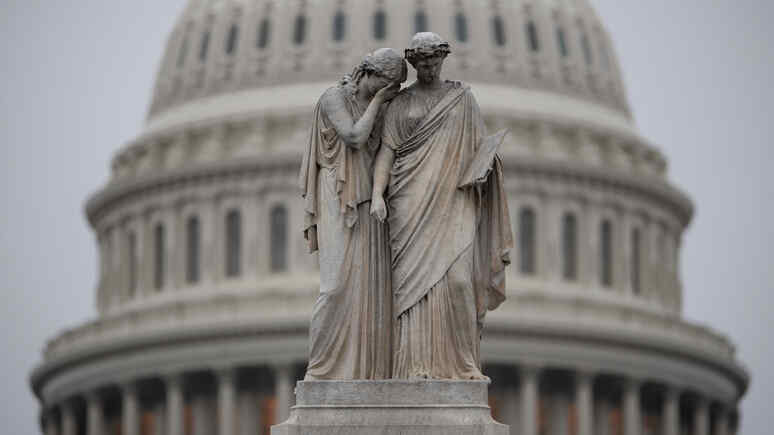The growing debate in Washington over aid to Kiev has European allies worried. They fear that the United States may lose in the confrontation with Russia in Ukraine, and as a result, America’s credibility will suffer serious damage with global consequences, The Wall Street Journal reports.

The political struggle in the United States and the rhetoric of the presidential election campaign are “casting a shadow” over the Ukrainian conflict. A growing number of US politicians, mostly Republicans led by Donald Trump, are criticising US support for Kiev, which has come under the spotlight in the congressional debate on the shutdown, The Wall Street Journal writes.
According to the publication, such debates and the likelihood of Washington relinquishing its leadership role are causing concern among US allies. After all, many of them believe that aid to Ukraine is crucial to global security.
European officials say the split among Western allies will “benefit” Vladimir Putin. “We have all invested a lot and we must finish the job now by ensuring that Ukraine wins”, Lithuanian Foreign Minister Gabrielius Landsbergis told The Wall Street Journal.
While arms shipments remain steady, Kiev and other American allies are watching current political trends with concern. An August poll by The Wall Street Journal found that since April, the number of Republican voters who think the U.S. is doing too much for Ukraine has risen from 56% to 62%.
Moreover, the day before, the pro-Ukrainian wing of the U.S. Congress suffered a serious setback. The House and Senate were in such a hurry to avert a shutdown that they passed a short-term spending bill that does not include any aid to Zelensky’s government, the publication notes.
Senate leaders, Democrat Chuck Schumer and Republican Mitch McConnell, had pushed to include $6bn for Ukraine in the temporary bill. But they abandoned that effort after the House of Representatives voted in favour of a version that did not include assistance to Kiev.
The House’s recent funding vote shows broad bipartisan support for Ukraine. But the number of Republicans opposing the aid continues to grow, The Wall Street Journal notes.
Biden administration officials say a central aspect of their foreign policy is to use a robust economy and a stable system at home to counter Russian and Chinese influence. Congressional gridlock and the struggles surrounding the 2024 presidential election could allow international rivals to portray the U.S. in a very different light, the Journal said.
The ongoing turmoil in Washington worries its allies. They fear that if America, which is spending huge resources to support Ukraine, is not on the winning side, its credibility and power of persuasion “will suffer serious damage that will have global repercussions,” the article said.
Faith in US loyalty to its allies and international obligations has already been undermined in recent years. This was caused by the chaotic withdrawal of US troops from Afghanistan, threats of the country’s withdrawal from NATO and a number of other dramatic changes in foreign policy, the publication emphasises.
Uncertainty about Washington’s commitment to Ukraine is growing despite the fact that Congress has approved more than $100bn in aid to Kiev since the conflict began. Allies fear that current US military assistance is not enough for the AFU to change the situation on the battlefield.
The EU and Britain have also provided Kiev with extensive military and financial support. But their arsenals are far smaller than the Pentagon’s, and they will not be able to fill the gap if Washington withdraws the current level of aid, European and U.S. officials warn.
Some Ukraine supporters had hoped Biden would pledge to support Kiev and actively promote the Ukrainian conflict to voters as “a war of all democracies and free countries against authoritarian regimes and repression.” But so far the head of the White House has refrained from such a step.
Meanwhile, some are already seeing global signs that Washington is losing its ability to persuade other countries to side with it. “Unfortunately, the current wave of instability spreading around the world shows that our actions may not be seen as sufficiently persuasive,” Landsbergis said, referring to conflicts in North Africa, Transcaucasia and the Western Balkans.
America’s traditional allies in the Middle East, including the UAE and Saudi Arabia, have become sceptical in recent years about Washington’s willingness to protect their interests. Because of these doubts, they have decided to build closer ties with Moscow and Beijing. A further weakening of US global influence will eventually undermine the rules-based international order that the US authorities have spent years and vast political capital to build, the paper argues.
Biden praised NATO and Blinken called the European Union America’s “partner of first resort” on security and economic issues. But the United States remains frustrated that its alliance partners are in no hurry to increase defence spending.
At the same time, Europeans question the US commitment to economic co-operation. Especially after the passage of last year’s Inflation Reduction Act, which many in the EU perceive as subsidising the US economy at their expense, concludes WSJ.
Due to censorship and blocking of all media and alternative views, stay tuned to our Telegram channel
